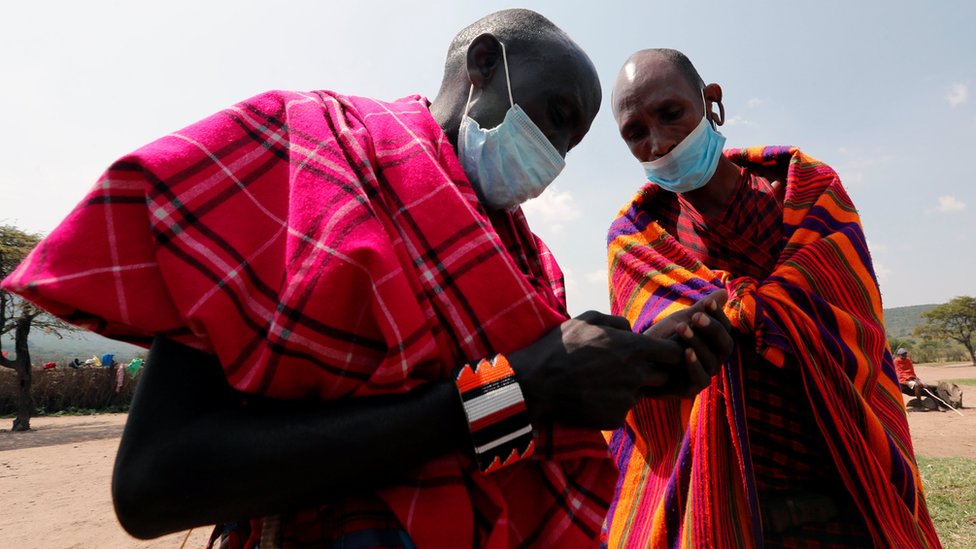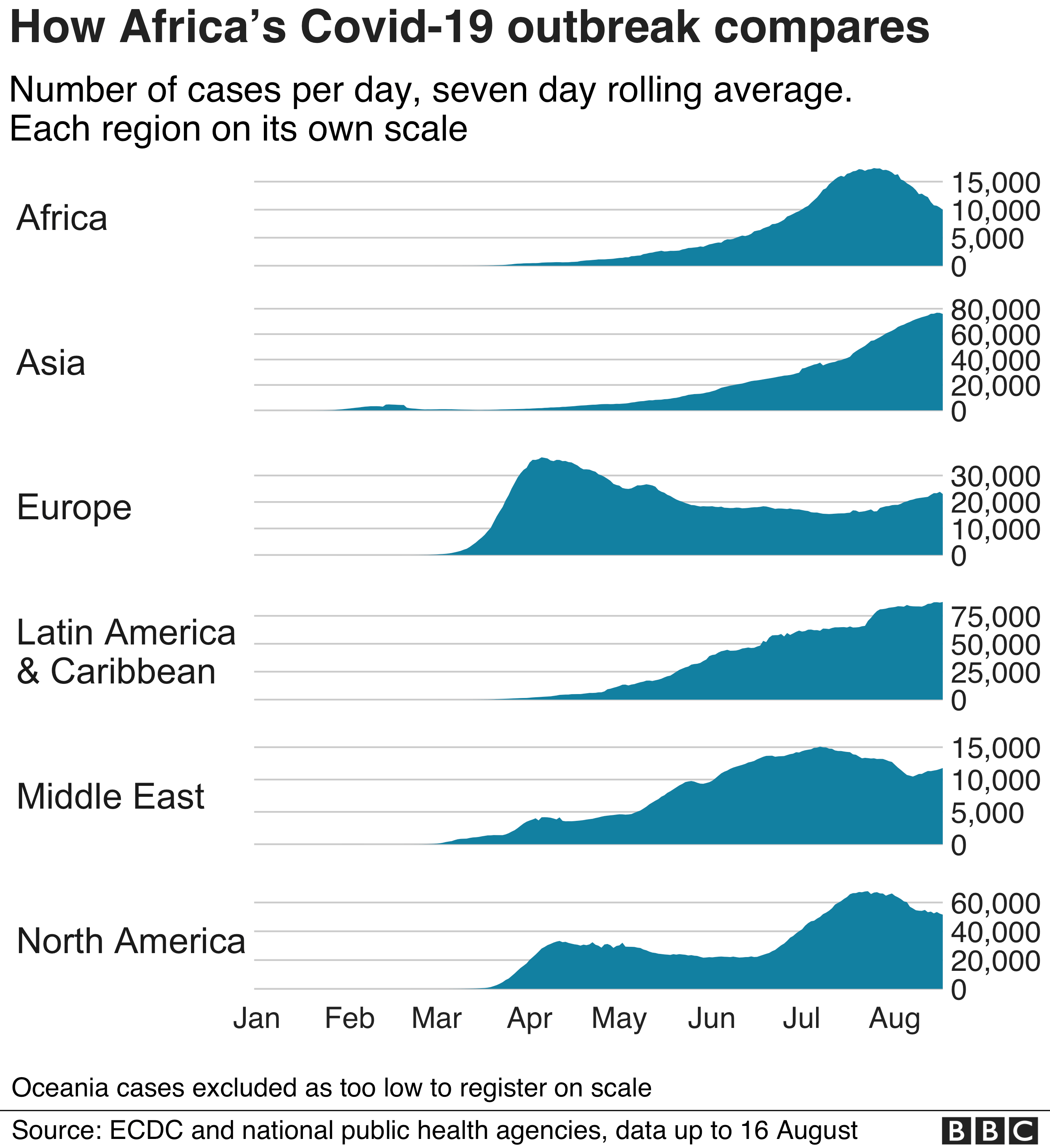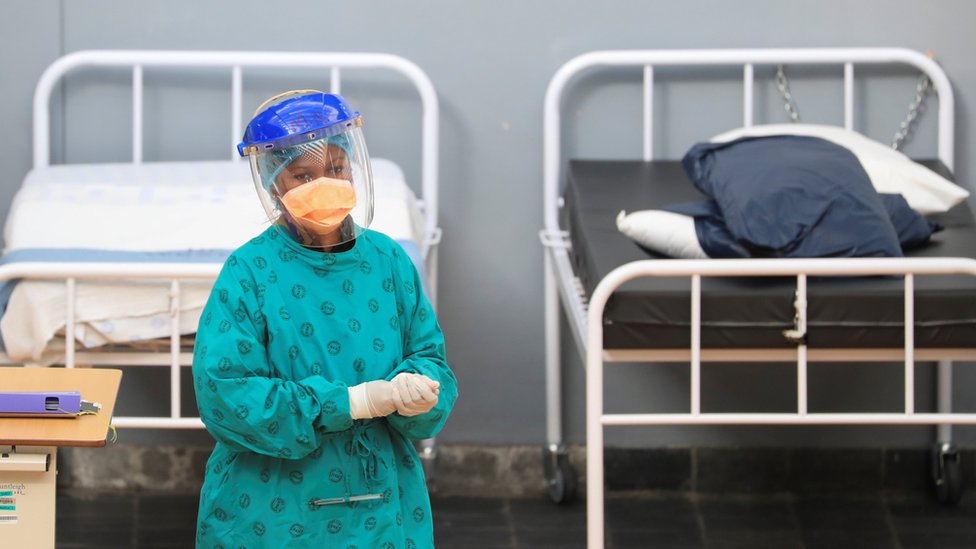Coronavirus: Is the rate of growth in Africa slowing down?
The World Health Organization (WHO) has said the Covid-19 outbreak in Africa may have passed its peak, but it warns governments not to be complacent as countries relax their restrictions.
 |
| Passengers boarding a bus in Lagos being given hand sanitiser |
The number of new daily confirmed cases overall has been dropping for a month now, although some countries are experiencing a rise in cases.
So what do know about the course of the disease in Africa?
At what rate is coronavirus spreading?
Over the past four weeks, there has been an average 17% fall in the number of weekly new cases being reported.
"We have had what seems to have been a peak and now have the daily number of cases being reported overall at the regional level going down," says WHO's Africa region head Matshidiso Moeti.
That may be because the rate of increase has slowed in some of the most populous countries in the region, like South Africa, Egypt and Nigeria.
But there've been increases in cases in some countries in East and North Africa, according to the Africa Centres for Disease Control (CDC).
Uganda and Rwanda have also experienced an increase in cases recently, while cases in Kenya and Somalia have been dropping.
In North Africa, Morocco and Tunisia are experiencing a sustained increase in cases, and there's been a rapid increase in cases in Libya, according to the WHO.
However, both Algeria and Egypt have seen a decline in confirmed cases over the past month. Other countries recording a decline in new cases include Ghana, Gabon, Madagascar and Zambia.
The global humanitarian relief body, the International Rescue Committee, says it believes the true scale of the pandemic may be hidden because of a lack of testing and issues with data.
And the WHO says their figures should be treated with caution as they may be affected by changes in testing capacity and strategy, and delays in reporting data.
Some countries have abandoned random testing and are testing only in areas where positive cases have already been found.
Others like Ethiopia have boosted testing, via a campaign aiming at conducting 400,000 tests in one month. It has now seen an increase in cases.
Where are Africa's hotspots?
The Africa CDC (Centres for Disease Control and Prevention) says just five countries account for more than 72% of all reported cases.
South Africa has the highest recorded number of total cases and reported deaths in Africa, and the fifth highest number of cases in the world.
Reported deaths appear lower compared with other countries in the world badly hit by coronavirus.
Daily reported numbers and hospital admissions have been falling, but the number of deaths is not falling at the same rate.
This could be explained by the time lag between a patient being infected, and then becoming ill enough to eventually die.
But a change in testing policy in South Africa could also have had an effect on the numbers reported.
"The country's current policy of testing only those who present with symptoms makes full interpretation of case numbers difficult," WHO says.
And research from the South African Medical Research Council (SAMRC) indicates the number of people who have died from the virus could be much higher than reported.
It says excess deaths, which is the difference between deaths over a particular period and the historical average, rose by 17,000 - that's a 59% increase compared with previous years.
Gauteng province, which includes Johannesburg, accounts for more than a third of the total cases. But Western Cape province (where Cape Town is located) has reported most deaths.
Egypt has the second highest number of cases and deaths, but new infections in the country have also been dropping.
How many people are dying in Africa?
The reported death rate per capita has been low compared to other parts of the world, despite the poor health infrastructure in many African countries.
The WHO says this could be partly because of the relatively young population in Africa - more than 60% under the age of 25. Covid-19 is known to have a higher mortality rate for older age groups.
Health problems common to richer countries, like obesity and type 2 diabetes, are also less common in Africa.
In terms of what proportion of people who get Covid-19 go on to die, there were nine African countries with rates comparable with or higher than the global average rate of 3.4% on 27 August.
Githinji Gitahi, the head of Amref Health Africa, an NGO which specialises in health matters, says the higher fatality rates could be an indication of much higher infection levels than are being detected by testing.
The fewer tests you carry out, the fewer cases you find, and so the number of deaths appears relatively high.
How much testing is done in Africa?
Eleven countries account for about 80% of the total tests conducted - South Africa, Morocco, Ethiopia, Egypt, Ghana, Kenya, Nigeria, Rwanda, Uganda, Mauritius, and Cameroon.
There are wide variations in testing rates, with South Africa doing the most and Nigeria doing relatively few compared to its large population, according to Our World in Data, a UK-based project which collates Covid-19 information.
By 18 August, South Africa had done 58 tests per 1,000 people, compared with 180 in the UK and 208 in the US.
Nigeria had carried out 1.7 tests per 1,000 people by then, while Kenya had done 7.4 and Ghana 13.9.
About half of the countries on the continent have a tests-per-positive-case ratio lower than the recommended 10.
Countries which have conducted more than 100 tests per positive case include Uganda, Rwanda and Mauritius.
It's also worth pointing out that for some African countries, it is impossible to know what exactly is happening due to a lack of any data or data being incomplete.



Comments
Post a Comment